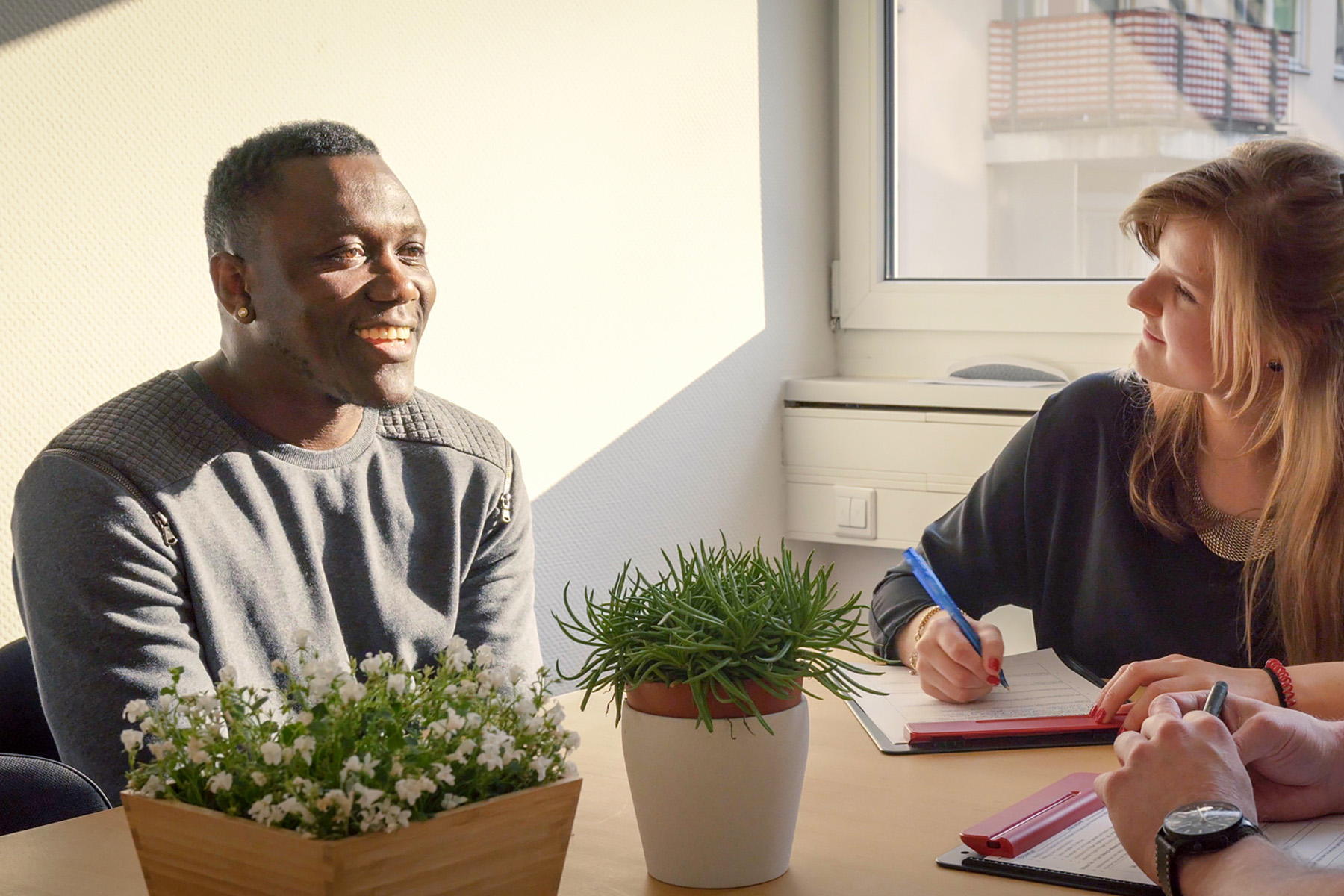Social Challenge and Innovative Solution
After risking their lives in the hope of finding a safer environment, refugees are faced with many challenges in their new home country: from culture shock and language barrier to having issues to access health and social services. This often results in their stigmatisation and a negative public perception about their skills and potential. They tend to be seen as a burden to society if they don’t contribute, work and pay taxes. This, in turns, makes it very difficult for refugees to find a job. It is estimated that around 500,000 refugees are unemployed or looking for a job in Germany. For companies, employing refugees is associated with high bureaucratic barriers.
Social-Bee‘s mission is to overcome barriers for corporates to employ refugees and asylum seekers. Social-Bee defines itself as a specialised employment and integration service provider. It has adapted the traditional temporary employment model to the refugee situation, as it aims to integrate them into the labour market and society.
Following a tailored selection process that is meant to identify motivated candidates, Social-Bee offers refugees and asylum-seekers a job opportunity by hiring and placing them as temp workers to partner companies. Social-Bee takes on all the bureaucratic process of hiring a refugee, including visa and asylum applications. During the employment term of up to 18 months, Social-Bee provides them with a fixed salary and supports their language and professional education as well as the cultural and corporate integration through targeted programmes. For corporates, this service substantially reduces the administrative burden to hire refugees, and gives them the opportunity to test and get to know the true potential of future employees.
Social-Bee's Business model

Key Social Impact Figures
July 2019
* percentage of employees which are still employed four months after completing at least 3 months of the Social-Bee programme
Investing for Impact
How it started
When The Financing Agency for Social Entrepreneurship (FASE) heard about Social-Bee’s model and impact, they got in touch and started exchanging ideas. Social-Bee has had discussions with traditional capital providers earlier on, but felt that their social impact would be much less valued and central to their model if they pursued this path. FASE was therefore an ideal partner in helping them find the right type of capital – from social investors.
After bootstrapping by the two founders, Zarah Bruhn and Maximilian Felsner, and initial grants from two German foundations, Social-Bee started looking for more substantial funding in 2017 in order to firmly establish itself and its model. The funding was supposed to further build up services in the Munich area, expand outreach to corporate clients in other sectors as well as to scale to other regions within Germany.
FASE itself is not a social investor but a financial intermediary that helps connect social enterprises with impact investors and philanthropic capital providers. FASE specialises in supporting social enterprises that already have a potentially self-sustainable business model but struggle to find growth capital as they are not yet in a mature stage. This stage is often referred to as being in the ‘Valley of Death’ (“Too big for donations/philanthropists, too small (and risky) for institutional (social) investors“).
To build the bridge between investees and social investors, FASE provides extensive non-financial support to help social enterprises become investment-ready and master the often time-consuming process of attracting impact investment. FASE advises on the most suitable financing model, introduces selected SPOs to potential social investors, foundations and donors, and manages the entire transaction process, including supporting term sheet (i.e. preliminary terms of investment) negotiations and closing, thus becoming a trusted advisor to both sides of the capital equation.
Support provided
As an intermediary, FASE supported Social-Bee in the entire process of raising a round of social investment of about €600,000. This included advice on designing and implementing a suitable hybrid financing model for all the stakeholders involved. With this round came various types of investors: several foundations (Schöpflin Foundation, Hans-Weisser Foundation, Canopus Foundation, Ippen Foundation), business angels as well as a family office. FASE’s role, among others, was to make sure that financial and impact expectations are being met on both sides, helping everyone speak the same “language”.
When structuring the financing model, it was decided to go for a four-year subordinated loan with an embedded impact incentive: the loan is linked to a specific, pre-defined social impact milestone. This makes financing conditions more attractive and inexpensive for Social-Bee once it has successfully achieved its output targets at the end of the loan tenure. The mechanism builds on the KPI “integration success rate”, measured by the number of successfully placed migrant workers, divided by the total number of migrants who have been in the social enterprise’s temporary employment and qualification programme for longer than 3 months.
Theory of Change, Impact Strategy, IMM

Theory of Change, Impact Strategy, IMM
Financial management

Financial management
Fundraising

Fundraising
Management team and CEO support

Management team and CEO support
Business planning

Business planning
Strategy consulting

Strategy consulting
Impact Measurement and Management
Given that FASE deals with a diverse group of capital providers, it is often faced with different approaches to impact measurement and management. FASE’s role is then to make sure that all stakeholders have the KPIs and information they need and everything is aligned without putting too much burden on the investee.
For Social-Bee, the most important KPI is the integration success rate which demonstrates the percentage of employees who were employed at Social-Bee for the duration of at least three months and are still employed four months after completing the Social-Bee programme. To follow up and establish whether the programme was successful, and to find out how the “Social-Bee alumni” are doing, they are contacted two, four, eight and 16 months after they complete and leave the Social-Bee programme.
As language training is both an important part of the Social-Bee programme and essential for integration, another important KPI is the increase of German language proficiency at the end of the programme in comparison to when it started.
Furthermore Social-Bee conducts an evaluation on all additional training programmes as well as how the entire process is being rated by participants (recruiting, general support, German courses and other offers).
Social-Bee has also done a lot of work in raising awareness about the potential of refugees, in particular with a strong campaign called, “Soft skills can come the hard way”, by breaking stereotypes and sharing personal stories to put forward refugees’ unique skills. This campaign took place online but was also highly visible in the streets of major cities in Germany, on billboards, train stations, etc., The campaign was designed by the agency JungvMatt and supported by Ströer, the leading German provider of out-of-home media and advertising.

What they think
What's Next?
In 2019, Social-Bee started to scale beyond Munich by opening a subsidiary in Stuttgart, another major German city. Its business model is not a quick one to be replicated since it is very resource intensive. Also, regional competitors (regular temporary employment agencies), job markets, industries and skills demand vary from one location to another. Social-Bee needs to build and secure the right corporate partners first to be able to successfully place migrants and refugees after they went through the temporary employment and qualification program. As to future funding, Social-Bee and FASE are in discussion for another potential collaboration in securing growth capital for scaling.






